Theresa May has been forced to reaffirm the UK government's commitment to the Good Friday Agreement, after several leading Brexiters suggested the accord had run its course.
After speaking with Irish Taoiseach Leo Varadkar on Monday evening, a spokesperson for Number 10 said "They spoke about the recent phase of political talks in Northern Ireland and of their disappointment that an agreement had not yet been reached to restore an Executive.
"Both leaders recognised the progress and serious engagement made by the parties.
"The Prime Minister said she believed there was scope for agreement and reiterated the UK Government's priority was still to get devolution up and running again in Northern Ireland."
Irish Foreign Minister Simon Coveney, labelled attacks on the agreement as reckless and irresponsible. "Talking down [the] Good Friday Agreement because it raises serious and genuine questions of those pursuing Brexit is not only irresponsible but reckless and potentially undermines the foundations of a fragile peace process in Northern Ireland that should never be taken for granted."
Leading Brexit figures including Labour MP Kate Hoey and Daniel Hannan, a conservative MEP, all this week questioned the accord, which forms the basis of Northern Ireland's devolved government in Stormont. Some have accused them of placing Brexit before the peace agreement.
Mrs Hoey, told HuffPost UK this week "I think there is a need for a cold rational look at the Belfast agreement.
"Even if a settlement had been agreed a few days ago there is nothing to stop Sinn Fein or the DUP finding something else to walk out about in a few months. Mandatory coalition is not sustainable in the long term.
"The Belfast agreement has been changed slightly over the years with the St Andrew's agreement. We need to face reality - Sinn Fein don't particularly want a successful Northern Ireland. They want a united Ireland."
Whilst writing in The Telegraph, Daniel Hannan claimed the agreement's "flaws have become clearer over time", describing it as "a bribe to two sets of hardliners".
Former UK Northern Ireland secretary, Owen Paterson, also retweeted an article suggesting it had "outlived its use".
Talks to restore Northern Ireland's devolved government collapsed last week, the region has been without an executive for over a year. Indications that the UK government would be forced to impose a period of direct rule on the region heightened yesterday when the UK's Northern Ireland secretary Karen Bradley, warned that Westminster had "no choice" but to impose a budget on Northern Ireland.
Theresa May insists UK committed to Good Friday Agreement
Leading Brexiters have this week suggested that the peace accord is no longer fit for purpose

Editor's picks
More from the national






